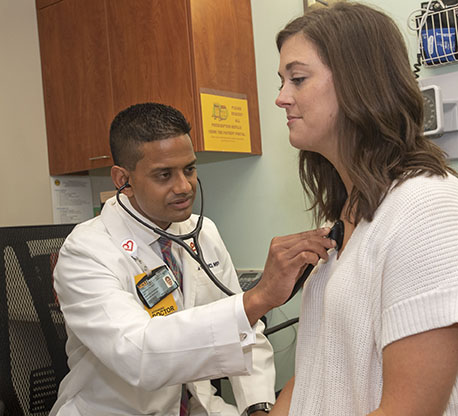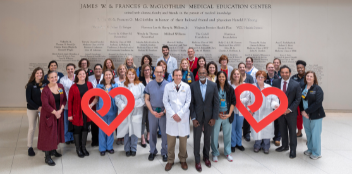Faculty spotlight: Deepak Thomas, M.D.
Getting to know the medical director at VCU Health Colonial Square

Deepak Thomas, M.D., MPhil, FSCAI, joined the Pauley Heart Center in 2015 as an assistant professor, specializing in interventional cardiology. He serves as medical director at VCU Health Colonial Square. He works downtown at the VCU Medical Center campus as well as serves patients in Petersburg, Hopewell and Colonial Heights, conducting peripheral vascular and percutaneous coronary interventions. He is board certified in interventional cardiology, general cardiology, echocardiography, vascular ultrasound and internal medicine.
Why did you pick the field of cardiology, and specifically, interventional cardiology?
There’s something attractive about studying when things are quiet and then using that knowledge in hyperacute situations. If somebody’s ECG shows that I’m needed, I’m glad I have the training to win the day.
How did your relationship with VCU Health Colonial Square start? What drew you to the Tri-Cities?
My father-in-law, George Eapen, M.D., had trained under George Vetrovec, M.D., and was one of the founders of a private group in Colonial Heights. My wife and I had trained in medicine all over the U.S., and with two of our three children born during our medical fellowships at Barnes-Jewish Hospital in St. Louis, we thought best to come home to Virginia. I knew that mentorship was important, and who better than Dr. Eapen?
As medical director, what are your goals for Colonial Square?
We strive to bring high-quality care to an area that remains disenfranchised. My personal mission is to bring patients from the Interstate 95 South corridor into the university for more evidence-based practice.
What’s a typical week like for you? Describe your duties/routine.
Work life is busy with both general call and STEMI (interventional) call, but I’m committed to our office practice for two full days a week in Colonial Square, with the rest of my time usually best spent within the catheterization suite at VCU Medical Center. I make myself easily available to primary care within the Tri-Cities area and beyond, answering questions via phone and seeing patients whenever I can in both the inpatient/outpatient settings.
Do you have any research interests in the field of cardiology? If so, please describe them.
While not a researcher, last year I was asked to join core faculty within the interventional section of cardiology at VCU. I study and listen attentively, eager for ways to integrate the latest in medicine into the nitty-gritty of real-world clinical practice and teaching. I train both interventional and general cardiology fellows within the apprenticeship model of modern medical education.
Do you have a personal philosophy or mantra that guides your work? If so, what is it and why?
My practice philosophy within interventional cardiology is a little conservative — I would not call myself an “early adopter.” My hope is that my daily attention to labor shines through via the various metrics used to judge a cardiologist’s career success. If a cardiologist is judged by volume of practice and outreach, then I think I succeed.
What does “a good day at the office” look like for you? What will you have done or achieved?
A successful day is when patients understand that I am listening — that I am a joint partner in their own success. Even if I sometimes don’t agree or have advice that is hard to hear, many patients know that I have their best interest in mind. Most of the people I see understand that I am not trying to be their friend, but a good doctor. Certainly, this isn’t an argument-free path forward, but it helps me sleep at night.
Describe a patient encounter that made you say, “Here’s why I keep doing this. Here’s why my work matters.”
It’s still amazing to me that attention to detail can make all the difference. I remember recently working with a primary care doctor in the community to switch antidepressants owing to a potential side effect of hypertension. Sure enough, rather than adding more drugs, the change in antidepressant brought the patient to normotensive blood pressure values. This is one example how a not-so-exciting adjustment can have real implications.
How do you like to spend your free time?
I run like I’m going for the ice cream truck. I wake up at 4 a.m. and run 10-15 miles daily, averaging 70-80 per week with long runs on weekends. I joined our Pauley cath lab book club recently and enjoy the exposure to different perspectives I would never appreciate otherwise. The rest of my time, I try to put my phone away and listen to my children as they learn and adapt to the world around them.


